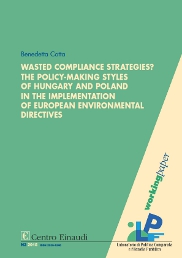- Ricerche e Progetti
- Biblioteca della Libertà
- Pubblicazioni e Working Paper
- Articoli e media
- Eventi e notizie
2015
Wasted compliance strategies? The policy-making styles of Hungary and Poland in the implementation of European environmental directives
WP-LPF 3/15
- Categoria/Category
- WP-LPF 2015
- Autore/Author
- Benedetta Cotta
- Editore/Publisher
- Centro Einaudi
- Luogo/City
- Torino
- Articolo completo/Full text
- WP-LPF_3_2015_Cotta.pdf
Abstract
How does the policy-making process affect policy compliance? Analysing the
relationship between policy outcomes and their decision-making processes, the
article explores the process of implementation of European directives in two CEE
countries namely, Hungary and Poland, in the waste sector. Hungary and Poland
have been considered as similar cases for their historical, political and economic
experiences; however, EU monitoring reports have shown that these two
countries have differently performed in the adoption and implementation of the
EU waste legislation. The explanation for variation considered in this article relies
on the existence of different “styles” of policy-making. To operationalise this
concept, in the article is adopted the typology of “policy style” defined by
Richardson (1982) which distinguishes between the environmental institutional
and legal settings and the stakeholders’ involvement in the policy-making. The
analysis of the Hungarian and Polish cases shows that, while similarities have
characterised the legal and institutional environmental decision-making settings,
greater difference has existed in the effective involvement of stakeholders in the
environmental policy-making. In Hungary, front-runner in the implementation
of the European waste legislation, we have the establishment of open and
coordinated arenas of cooperation and consultation in which the stakeholders
multilaterally are involved. In contrast, in Poland, laggard in the implementation of
the EU waste legislation, we have the establishment of personal, bilateral and
informal relations between officials of the Environmental Ministry or the
Members of Parliament and the stakeholders involved in the environmental
decision-making. Hence, the paper demonstrates that the existence of variations in
the involvement of stakeholders determines also variation in the policy outcomes
and may also explain variation in the compliance with the European legislation.







